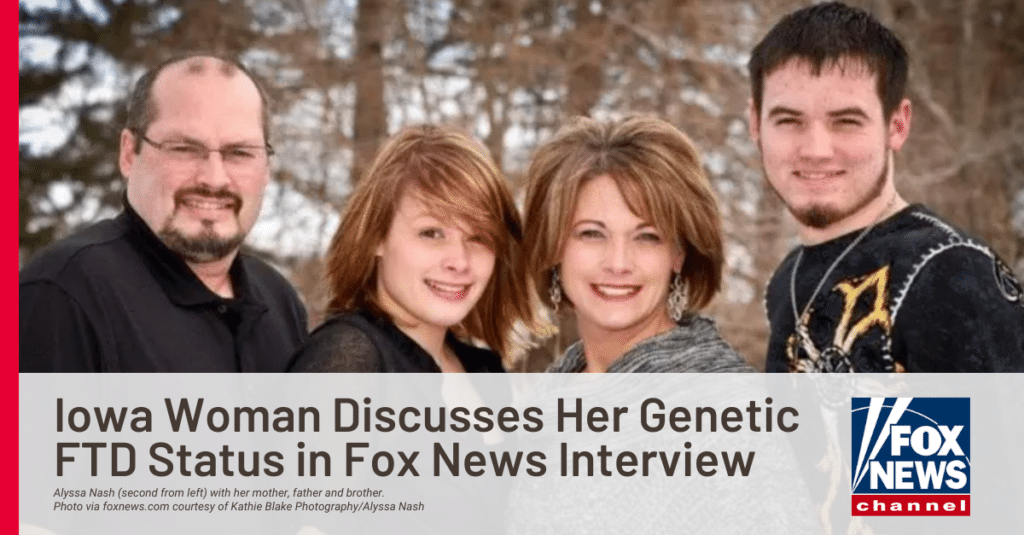Iowa Woman Discusses Her Genetic FTD Status in Fox News Interview

Alyssa Nash, a 27-year-old hospital receptionist, shared her experiences on the FTD journey and learning she carries a genetic FTD causing mutation in a May 19 article published by Fox News.
As shared by Nash’s mother, AFTD Ambassador Deb Scharper, in an interview with The Healthy, Nash’s father, Tommy, first began to show signs of FTD in 2008 when he started to lose interest in life-long passions and developed compulsive behaviors. Tommy was initially misdiagnosed with depression, possible schizophrenia, and possible bipolar disorder. For seven years, Nash, her brother, and her mother would be left wondering what was happening to Tommy.
“The biggest challenge was seeing him change completely into someone else and become someone I never thought he could be,” Nash said. “And having to grow up in that atmosphere — it was tough.”
As she navigated high school, Nash also served as a care partner for her father alongside her family. Nash says she often struggled to hide her father’s condition from others at school.
“I basically had two lives. I didn’t tell anyone at school because I didn’t want to be different — I wanted to feel normal, in a sense,” Nash said. “But then I’d have to go home right away to help take care of my dad and make sure he was okay.”
Tommy was eventually diagnosed with FTD caused by a genetic variant. As revealed in the interview with Scharper, the death of Tommy’s father from ALS shed light on the genetic link between it and FTD. A mutation of the C9orf72 gene is the most common genetic cause of ALS and FTD and can sometimes cause both diseases to manifest in the same person.
When Nash learned she could seek genetic testing to determine her risk, she immediately pursued the opportunity.
“I needed to know because, for so many years, I wasn’t in control,” Nash said. “I needed to make a plan. This was a chance to be in control of myself.”
At age 20, Nash learned she carried an FTD-causing gene mutation. The news made Nash fear for her future – at first, it felt like she had just been handed an FTD diagnosis.
As the years passed, though, Nash found that knowing her genetic status helped her appreciate more in life. “I feel empowered by this knowledge,” Nash said. “It’s going to help more than I could possibly imagine. That flip of the brain was definitely needed. I wouldn’t want my worst enemy to have to go through what I went through without having the answers.”
To others on the FTD journey, Nash recommends being open with your feelings and seeking support to help address the mental strain of having a family member with FTD.
“Put your feelings out there,” Nash said. “It’s okay not to be okay at times. It’s a heavy thing to carry, but knowledge is power. For me, I’m going to do everything I can to help people and to help myself.”
Are you worried about your genetic risk for FTD? Click here to learn more about genetic testing and what it entails. If you are interested in knowing your genetic status, AFTD strongly encourages undergoing genetic counseling to help you navigate testing and its risks; click here to learn more.
If you have questions about FTD genetics, genetic testing, or genetic counseling, reach out to AFTD’s HelpLine at 1-866-507-7222 or info@theaftd.org.
By Category
Our Newsletters
Stay Informed
Sign up now and stay on top of the latest with our newsletter, event alerts, and more…
